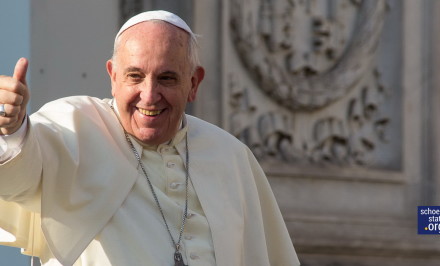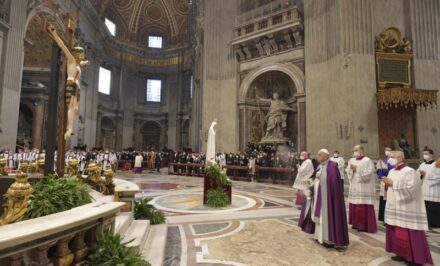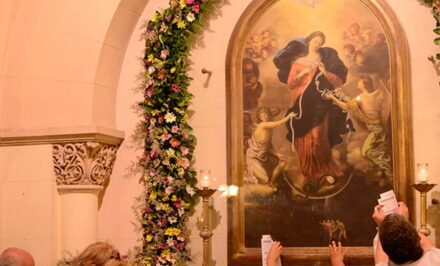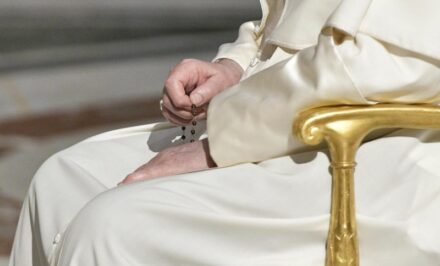 ARGENTINA, Dr. Carlos Eduardo Ferré/mda. Jorge Bergoglio’s election as the Pontiff of the Catholic Church has had a positive impact on the Church and the world. It was the event of 2013 and there is no doubt that it will be remembered as the real start of the 21st century. As we celebrate the first anniversary of Pope Francis’ election, the Máximo de San Miguel College (belonging to the Society of Jesus), which was his home in Argentina throughout his life as a Jesuit, invites everyone to celebrate and reflect on this occasion. The initiative is part of a project by various groups within the Church and civil society that have highlighted the historical importance of Francis’ pontificate and aim to accompany the mobilisation process that this is generating. Some members of the Schoenstatt Movement connected to the Social Day and the youth have joined this project, coordinated by Dr. Carlos Eduardo Ferré, the Director of the “John Paul II” Centre for Studies on the Church’s Social Doctrine in Argentina, the author of book The Social Saint, and a member of the Schoenstatt Family Union. They do all this under the banner: “Francis Generation.”
ARGENTINA, Dr. Carlos Eduardo Ferré/mda. Jorge Bergoglio’s election as the Pontiff of the Catholic Church has had a positive impact on the Church and the world. It was the event of 2013 and there is no doubt that it will be remembered as the real start of the 21st century. As we celebrate the first anniversary of Pope Francis’ election, the Máximo de San Miguel College (belonging to the Society of Jesus), which was his home in Argentina throughout his life as a Jesuit, invites everyone to celebrate and reflect on this occasion. The initiative is part of a project by various groups within the Church and civil society that have highlighted the historical importance of Francis’ pontificate and aim to accompany the mobilisation process that this is generating. Some members of the Schoenstatt Movement connected to the Social Day and the youth have joined this project, coordinated by Dr. Carlos Eduardo Ferré, the Director of the “John Paul II” Centre for Studies on the Church’s Social Doctrine in Argentina, the author of book The Social Saint, and a member of the Schoenstatt Family Union. They do all this under the banner: “Francis Generation.”
Why celebrate and come together?
 Pope Francis’ election has become a transcendent act in the life of the Church and the whole world, particularly in Latin America. These circumstances merit our reflection and bring us joy.
Pope Francis’ election has become a transcendent act in the life of the Church and the whole world, particularly in Latin America. These circumstances merit our reflection and bring us joy.
Francis began his papacy as the Bishop of Rome by bowing to the people to receive their blessing before blessing them as their pastor. His gestures and words told us that we were about to encounter a change given to us by Divine Providence, the kind of leadership for which society had been yearning. A leader who is coherent, who does what he says, who demonstrates with his life that the things he suggests are possible, that power is a service to promote the dignity of the human person and all of humanity.
Francis calls for a mobilisation process that is accompanied by a call to unity, restoring the people as the active protagonists for change. His actions have had surprising and immediate results, and they are genuine because they began in the hearts of those who were called.
Francis Generation – “because Francis’ words and actions are giving birth to something new.”
With God’s help we want to make the transition toward simplicity. This is why we feel that our lay vocation and our baptismal responsibility urge us to take up the challenge, and we set out, calling our attempt “Francis Generation.” This name originated in the reflections of those among us who are older and see Francis as the greatest example of our generation, and among the youths who realized that our generation would be marked by Francis’ actions as the starting point of a new phase in our history. A new phase for everyone, because Francis’ words and actions are creating something new.
Our name, “Francis Generation” has all of the temporality that characterises a journey, the progress, the pilgrimage with the pilgrim people. It does not aim to create a new institution but to point to an example, a sign of identity that anyone who is prepared to take on the mission can adopt.
A true culture of encounter
 Our efforts must be centred in finding points of contact to encourage dialogue between groups and people who want to help create a true culture of encounter, who are prepared to go beyond themselves to reach the existential peripheries, people who are convinced that it is possible to recreate politics, the economy, and community relations on the basis of dialogue, the acceptance of the other, a shared building with people who are the guarantee of unity in diversity. We do this because we believe that the Kingdom of God is already truly among us.
Our efforts must be centred in finding points of contact to encourage dialogue between groups and people who want to help create a true culture of encounter, who are prepared to go beyond themselves to reach the existential peripheries, people who are convinced that it is possible to recreate politics, the economy, and community relations on the basis of dialogue, the acceptance of the other, a shared building with people who are the guarantee of unity in diversity. We do this because we believe that the Kingdom of God is already truly among us.
For these reasons, the those who are promoting this meeting, and are themselves from various provinces, suggested that we contact and bring together all those groups and people who have a similar appreciation for the situation and want to take advantage of this opportunity that God is giving us.
We also want to encourage a process of spreading Pope Francis’ message and gestures and implement actions that encourage us, based on his ideas. This is why we have decided to begin the task and will gather, as the first milestone in this process, on the first anniversary of his pontificate, to celebrate with joy and to reflect on how we will go forward.
Themes for the meeting
The theme for the meeting on 15 March – the starting point of a path that is still to be defined – is based on a working document put together by the “Francis Generation” initiators, highlighting the moment of fundamental change, the “return of Vatican II” with all its impetus and the trend of “people moved to the heart,” what we in terms of our Kentenich spirituality describe as a “life current.” There is the option to go further, to “be on the streets,” practically applying actions in favour of “Francis’ favourites,” the poor in every sense, with practical works, because “the option for the poor takes on a real dimension that goes beyond all ideological speculation. Francis knows the poor and shows without pretence who the poor are, dispelling possible speculation that for a long time there was an attempt to hide the message of one of the Messianic signs, that the Good News was proclaimed to the poor.
Francis proposes a proclamation of the gospel “without gloss,” in other words, without interpretations because Jesus’ gestures and words are too eloquent.
With God’s help, we aim to become, the transition toward this simplicity. We have started to reflect on the fact that there is no mission or vocation that can omit direct contact with the humble, those who are last, the “dispensable” as Francis called them in Aparecida.
In covenant solidarity with Francis
 “Why this project?,” we asked Carlos Ferré in an interview with schoenstatt.org. “It is necessary to combine efforts in those spaces that place the greatest emphasis on this charism because institutions, irrespective of whether they belong to the Church in its entirety, such as the Movements and Orders, have been too slow and in some cases (too many unfortunately) clearly resist change. And I’m not even talking about those who are openly against it.
“Why this project?,” we asked Carlos Ferré in an interview with schoenstatt.org. “It is necessary to combine efforts in those spaces that place the greatest emphasis on this charism because institutions, irrespective of whether they belong to the Church in its entirety, such as the Movements and Orders, have been too slow and in some cases (too many unfortunately) clearly resist change. And I’m not even talking about those who are openly against it.
Abandoning the security of the things we know how to do something new generates panic among many people, and even if they don’t show it, they tend to continue with their customary programs where they repeat what they have done in past years.
At a recent meeting with a prominent Argentinean archbishop, he said that Jesus Christ is the same yesterday, today, tomorrow (a truth which we clearly share) but his underlying message was to say that nothing had changed in the Church…”
Dr. Ferré was moved and very happy to find the same concern in taking up the grace of renewal that comes with Francis in a text written by Fr. Carlos Padilla “One hundred years of journeying, a look at Schoenstatt,” (translatiion planned) but especially the proposal by Fr. José Maria Garcia (both from Madrid) of entering into covenant solidarity with Francis in his article “We have a Father, courageous and without complexes – for a culture of encounter, of dialogue and covenant” and in other moments, mostly during the Congress of Schoenstatt Businessmen and Executives (CIEES2013) in Costa Rica.
“We will dedicate all the time that we have available,” says Carlos Ferré, “to talk about and dream about how to make our covenant solidarity with Francis a priority for our Movement and all people of goodwill who want to participate.”
How to participate
We ask those who want to (and can) participate in the meeting on 15 March to help facilitate the planning by filling out the attached registration form and sending it to generacionfrancisco@gmail.com with proof of payment of the deposit/transfer indicated in the registration form.
In addition to this, Claudia Echenique from the schoenstatt.org dreamteam will attend with an open heart, a notepad and a camera.
English translation: Sarah-Leah Pimentel, Cape Town, South Africa
Working document (spanish)
Program (spanish)















